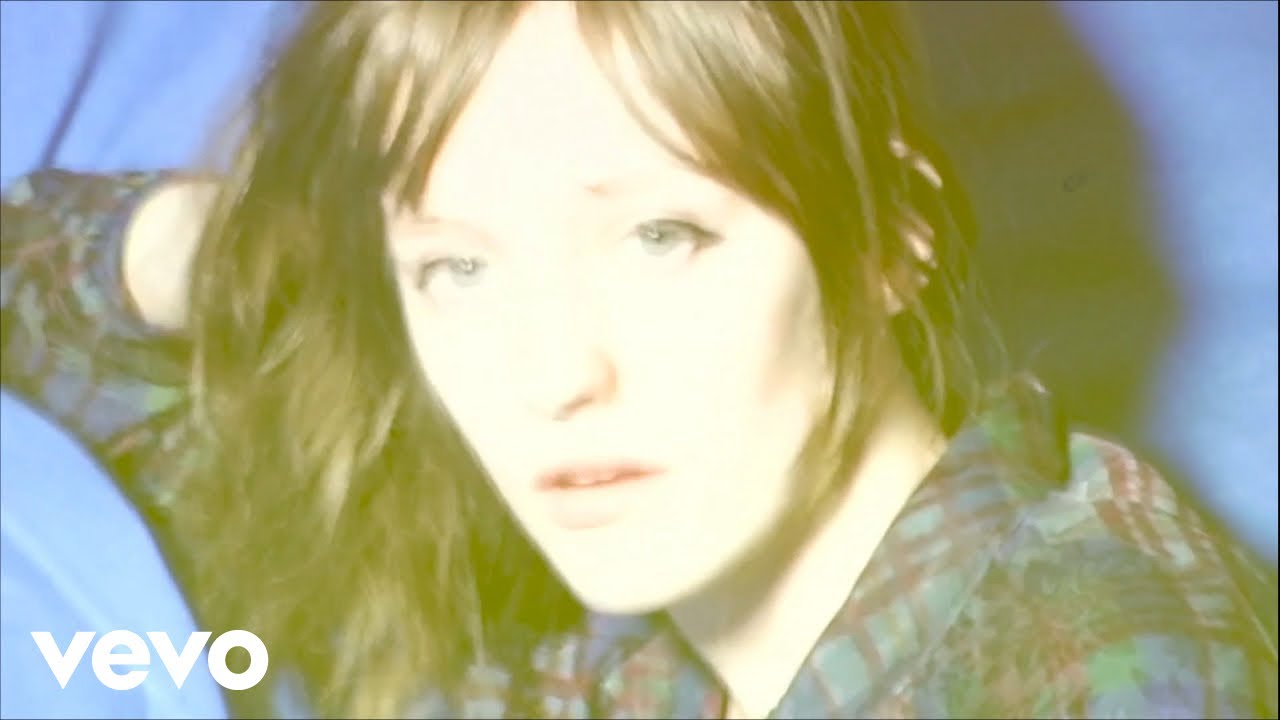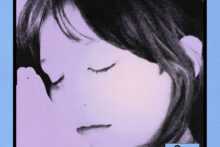The fields on either side of the dirt track look inviting at first – the gravel turning to green, the occasional yellow thatching grass and clusters of avid saplings a calming adjustment from the well-constructed chaos of End Of The Road Festival. Walking to the dead-end of each path, Anastasia Coope and tQ discuss this year’s lineup, as the sun battles down on security guards and volunteers in clashing shades of purple and yellow high vis, checking our wristbands, unsure whether or not we’re allowed to be here.
“So, what?” she questions. “If someone asks us whether we’re allowed, we tell them that we’re Idles? What is Idles?” She pauses, briefly, “I worry sometimes that I have so much disdain for everything. I don’t know what to do with myself. Let me look them up… is it like The 1975? I saw them when I was 16 and their projection of, like, rock is dead… that was my awakening of everything I don’t like about music.”
Before tQ can answer her question, we realise that we’ve each stepped in different piles of dried-up sheep shit, pellets stacked like guardian angels sent to save us from libel action at the hands of Healey and/or Talbot. She flings off one of her off-white Crocs only for it to land next to another fly-ridden cairn, checks the other’s Croc-holes for unwelcome widgets, and beaten by the inevitability of it all, sighs, taking in the vistas of Larmer Tree Gardens instead.
“Moses will be pissed,” she says, after a minute.
We left said tour manager disorientated, on the hunt for any details at all – stage times, parking, load-in – while we went to talk. Some earlier misdirection had made them late for lunch, and, knowing our conversation would delay their nourishment further, he quietly zipped up his jacket to hide the pragmatic message printed on his t-shirt, reading “This is an advertisement for Anastasia Coope [music].”
“If I say anything bad during this it’s just because I’m hungry,” she qualifies, momentarily worried. “Please make that clear.”
This will have been the longest amount of time that Coope has been away from New York City, once she returns home late November. Following a run of UK shows in early September, the 22-year-old songwriter and artist is now looking forward to a brief writing residency (cheap sublet) in London, and the second leg of her European tour in November.
As she takes the stage a few hours after our interview, playing the music from her debut album Darning Woman for the first time overseas, the music feels bewitchingly displaced. Each wafting note, vocal loop and gentle haunting seems as attached to her New York home as the hangings and trinkets she fills it with. It gives the impression of Coope as a houseguest, opening her suitcase to show the wonderful and plain gifts she’s brought with her; gifts all the more curious without the context of the strange no man’s land her particular corner of the city possesses.
“It’s somewhat near the Navy Yard and somewhat near South Williamsburg,” she clarifies, “but I’ve never heard someone describe it with a location. It’s just this crumbling loft.” When I visited her there last year to pick up my own advertisement t-shirt (following the launch of pre-Jagjaguwar double A-side ‘Tough Sun’/ ‘Seemeely’), it looked like a stage set, something temporarily built on top of itself, where well-chiselled characters might lean off their wonky balconies and sing at you before vanishing.
“It is a bit Fiddler On The Roof,” she says, stifling an agreement. “I’ve always wanted to stay near where I grew up, but not in a way that had to engage with the people I grew up with.” But she has an unmistakable tenderness for her surroundings, and speaks defensively of New York as a city that ebbs in and out of fashion. “I want to live upstate, but it’s really challenging because of how people talk about their surroundings when they’re not from there. I’m tired of people who aren’t from New York, who move to New York, and then get tired of the city.”
The record is its own document of New York in a way, made over the course of her lifetime there and patched together with all its thematic direction applied post-creation. Its musical touchstones vary from liturgical freak folk, mediaeval choruses and close-harmony groups to the softer séance of recent Josephine Foster releases, and the more proudly-worn comparisons of 1980s avant-garde art rock – as quoted, Trish Keenan, Su Tissue, Brigitte Fontaine. But she’s a singular voice. When Darning Woman occasionally sharpens its focus – note the electric strums in the outro of ‘He Is On His Way Home, We Don’t Live Together’, and the gentle piano and brass balladry behind album closer ‘Return To Room’ – it contextualises the strange patterns and words that might have otherwise drifted away.
“It wasn’t a pleasant thing, sitting down and recording this album,” Coope laughs. “I wasn’t really working on something with this record. Darning Woman is pickings from multiple years. These songs weren’t made in luscious times of beauty; I was mostly just sitting on the ground, in my apartment, forcing them out of me, getting interested in them for 10 minutes and then losing interest again.”
It makes the domestic sphere an intrinsic, but background, part of her writing, at least in the here and now. “I would say I’m a homely person,” she nods. “I like the inside of where I live, anyway. I’m very into decorating, and I like an early bedtime – oh, check this out,” she stops to pick up a rock. “I wonder if there’s a crystal inside it… probably not.” She throws it back on the grass, over a small wire fence, challenging its next finder. “And I collect things,” she continues on cue. “I like collecting furniture and decorations, and little nesting dolls. I like trinkets, I like blankets. I once found a really nice Italian lamp in the street. It had fallen over and there was this blackened spot where the light had burned into the plastic shade.”
Nesting against the disposable nature of materialism is a protracted comfort in her work; the acts of collecting, nurturing and fixing things, in her words, have become a treasured counterpoint to craven consumption. It goes beyond gathering physical objects – for Coope it also applies to sounds, memories, phrases. She’s emboldened by bands like Broadcast (using them as a universal example), on whose recent collection of demos, Distant Call, every sound counts. “And if it is a placeholder, then it’s because that’s started to mean something,” she says. “Everything has become rooted in the convictions of these people. Comparing that with what I feel now about a lot of new music – it feels very aspirational.” She acknowledges the generalisation, and the exceptions, but insists of a lot of “new” bands: “The songs are there, the words are there, the music is being played, but a lot of the grit behind it is gone. There are so many fake bands, who are really cool, doing all the things, but it’s just a cosplay.”
“I always feel frustrated about how little music there is that actually attempts to venture to this cosmic breakthrough,” she continues, apologising again for her negativity. “I feel like there’s this effective consumerism where every song and every taste gets worked into these large scale business models, which aren’t the fault of anyone individually. But the true auteur? It’s not their time right now. Everyone seems to be a median of everyone else’s taste. There’s a loss of the personal everywhere,” she continues. “Equally, I feel like people who are too positive – not with day-to-day things, there’s a lot of shit going on, but in a cultural sense – might be tending to the corporate world too much. Or just, like, misinformed?”
Making things matter has become a hard-to-define essential in her own work, as a result. “I feel a general urge to engage with everything, even if I don’t care about it,” she admits. “I think there’s a very clear sonic and aesthetic thing” – she hangs on the word – “that I’m trying to communicate here, and it shifts and it changes, but it hasn’t broken yet. I’m still writing new music with a similar vision; I want to take 1 per cent from every mode of living that I have and combine it into the most fantastical version of my world.”
Talking about the construction work behind these fantastical worlds, she says she gives way to a certain kind of nonsense. “I try to make songs up as I go along. Most of what I come up with isn’t very good, but once in a while I’ll say something – and I’m not sure why I’ll have said it – but it clicks, and that word enters a rotation.” But it’s not whimsical; within her structures, words become validated with each vocal layer and repetition – cleared of implication– until it’s their shapes that conjure weight. “A lot of the words lose their meaning at the start of the process, rather than at the end. Right now, the words in rotation are opera, cold and water.”
“You know, I didn’t even think of the word as “darning” when I wrote it,” she muses. “I thought about the word as “darn” – a woman saying “darn it.” But then these other domesticated words followed.” She shows me a patch on her sweatpants where she’d darned a hole with dusk blue threads, saying that she thought she should at least learn how it’s done, if people are going to start asking her questions about it.
“I don’t think I’m even subconsciously writing about something that in three years will become clear to me. But I do think that general themes are there, and I think they matter.”
We move to sit on two logs at the foot of the festival field, Coope perching lower down to pick at the bark. Vitalised, a purple volunteer walks towards us and asks if we’re meant to be here.
We get up, Coope picking off another piece of bark, and points to a dead fly.
“Is this garlic? It looks like garlic.”
Darning Woman is out now via Jagjaguwar. Anastasia Coope tours Europe in October and November, including a set in London as part of Pitchfork Festival’s Dalston takeover on 9 November





